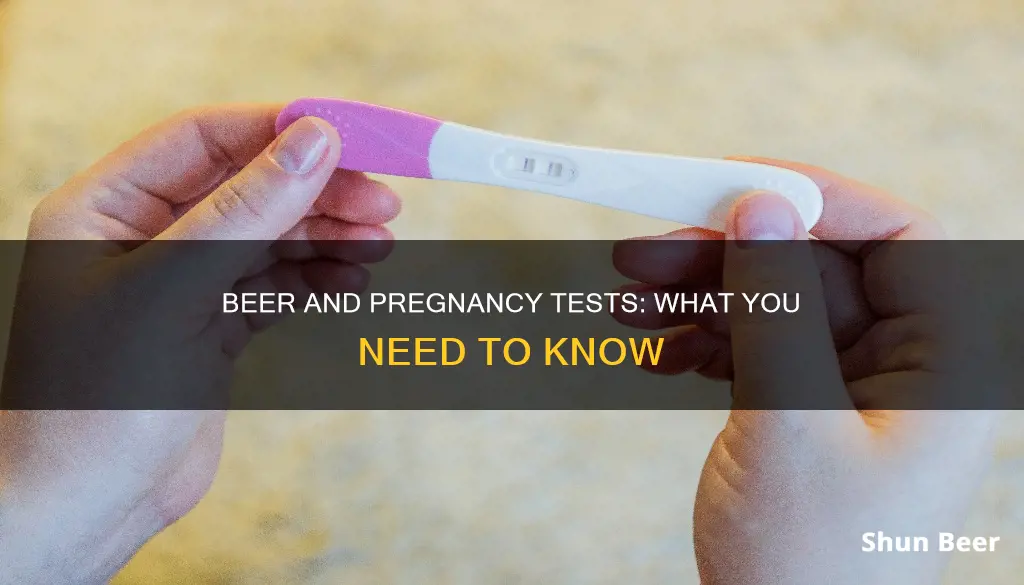
Drinking alcohol during pregnancy can be harmful to the baby's development and cause long-term medical problems and birth defects. It is recommended that women who are pregnant or trying to conceive should avoid alcohol. However, the question remains whether consuming alcohol can affect the accuracy of a pregnancy test. Home pregnancy tests are designed to detect the presence of human chorionic gonadotropin (hCG), the pregnancy hormone, in the urine. Alcohol does not directly affect hCG levels and therefore is unlikely to impact the accuracy of a home pregnancy test. However, alcohol can have an indirect effect, especially if the body has just started producing hCG, which may potentially lead to a false negative result. Additionally, hydration levels can influence the outcome, as excessive water intake can dilute urine and make it harder to detect hCG.
| Characteristics | Values |
|---|---|
| Does drinking beer affect the results of a pregnancy test? | No, drinking beer does not directly affect the results of a pregnancy test. However, it can have an indirect effect if your body has just started producing hCG (the "pregnancy hormone"). In this case, beer and other factors could possibly result in a false negative. |
| How does alcohol affect a pregnancy test? | Alcohol does not increase or decrease the level of hCG in the blood or urine, so it does not directly change the results of a pregnancy test. However, drinking can lead to dehydration, which can affect the concentration of hCG in the urine and potentially lead to a false negative result. |
| What are the risks of drinking alcohol while pregnant? | Drinking alcohol during pregnancy can lead to fetal alcohol syndrome, which can cause premature birth, low birth weight, and physical and developmental issues in the baby. It can also increase the risk of miscarriage. |
| What should you do if you drank alcohol before knowing you were pregnant? | If you drank alcohol before realizing you were pregnant, it is recommended to stop drinking as soon as you find out. While small amounts of alcohol early in pregnancy may not cause harm, there is no known "safe" amount, and the potential risks outweigh any benefits. |
What You'll Learn
- Alcohol consumption does not affect the accuracy of a pregnancy test
- Drinking alcohol while pregnant can harm the baby's growth and development
- Drinking alcohol while pregnant can lead to fetal alcohol syndrome
- Drinking alcohol while pregnant may increase the risk of miscarriage
- It is recommended that women who are pregnant or trying to conceive should avoid alcohol

Alcohol consumption does not affect the accuracy of a pregnancy test
It is a common misconception that alcohol consumption affects the accuracy of a pregnancy test. However, this is not the case. The accuracy of a pregnancy test is not directly influenced by alcohol consumption, unless it impairs your ability to follow the test instructions correctly.
Pregnancy tests are designed to detect the presence of human chorionic gonadotropin (hCG), also known as the "pregnancy hormone," which is produced by the placenta after implantation. Alcohol does not contain hCG. Therefore, it does not directly increase or decrease the level of hCG in the blood or urine, and consequently, it does not directly alter the results of a pregnancy test.
While alcohol does not have a direct impact on the test results, it can have an indirect effect if your body has just started producing hCG. In theory, alcohol and various other factors could potentially lead to a false negative result during this initial stage. However, this is not due to the alcohol itself but rather to the amount of water consumed after drinking alcohol, as hydration levels can slightly affect the test results. Drinking excessive water can dilute your urine, making it harder for the test to detect the hCG hormone, possibly resulting in a false negative.
It is important to note that alcohol consumption during pregnancy can be harmful to the developing baby. Official guidelines strongly advise against drinking any amount of alcohol during pregnancy due to the potential risks, including fetal alcohol syndrome and other long-term medical problems. Therefore, it is recommended to refrain from alcohol consumption if you are pregnant or planning to become pregnant.
Beer and Pregnancy: Is One Drink Safe?
You may want to see also

Drinking alcohol while pregnant can harm the baby's growth and development
When a pregnant woman drinks alcohol, it passes through her blood and into the baby's blood, tissues, and organs. The alcohol can remain in the fetus's system for longer than in the mother's system because the baby's metabolism is slower. This means the baby's blood alcohol level stays high for longer, increasing the risk of harm to the baby.
Drinking alcohol during pregnancy has been linked to an increased risk of miscarriage, stillbirth, and premature birth. It can also cause fetal alcohol spectrum disorders (FASDs), which include fetal alcohol syndrome (FAS), partial fetal alcohol syndrome (pFAS), alcohol-related neurodevelopmental disorder (ARND), and alcohol-related birth defects (ARBD). Children with FASDs may have intellectual and developmental disabilities, physical abnormalities, and problems with daily self-care.
In addition, alcohol consumption during pregnancy can lead to low birth weight, abnormal facial characteristics, small head circumference, and issues with eyesight, hearing, bone structure, heart, and kidneys. These problems can range from mild to severe and can last a lifetime.
The risks associated with drinking alcohol while pregnant are serious, and there is no known safe amount of alcohol consumption during pregnancy. Therefore, pregnant individuals and those trying to become pregnant should avoid alcohol completely until after the baby is born.
Do LCBO Gift Cards Work at Beer Store?
You may want to see also

Drinking alcohol while pregnant can lead to fetal alcohol syndrome
When a pregnant woman drinks alcohol, it passes through her blood and into the baby's blood, tissues, and organs. As the baby's liver is not fully developed, it cannot process alcohol effectively. This means that the baby's blood alcohol level remains high for longer than that of the mother, increasing the risk of harm to the baby.
Fetal alcohol syndrome can cause a range of problems, including behavioral and attention issues, changes in facial structure, poor growth, poor muscle tone, and problems with movement, balance, thinking, and speech. These complications can range from mild to severe and can last a lifetime.
The risk of fetal alcohol syndrome is highest during the first three months of pregnancy, but drinking alcohol at any time during pregnancy can be harmful to the baby. There is no known "safe" amount of alcohol consumption during pregnancy, and even light or moderate drinking can affect the developing fetus. Therefore, it is recommended that pregnant women or those trying to conceive abstain from alcohol completely.
If you have already consumed alcohol before realizing you were pregnant, it is important to stop drinking as soon as you find out. The sooner you stop, the healthier it will be for your baby. Additionally, seek medical advice from your doctor or midwife, especially if you have concerns about the potential impact on your pregnancy.
Bravo Capsule and Beer: A Safe Mix?
You may want to see also

Drinking alcohol while pregnant may increase the risk of miscarriage
Drinking alcohol while pregnant is not recommended by medical professionals. While it may be tempting to have a drink or two, especially if you did not know you were pregnant, it is best to avoid alcohol completely during pregnancy. This is because alcohol passes through the placenta to the baby, and their body breaks it down much more slowly than an adult's body. This means that the baby's blood alcohol level remains high for longer, which can be harmful to the baby and can sometimes lead to lifelong damage.
The risks associated with drinking alcohol during pregnancy include fetal alcohol syndrome, which can cause a range of problems for the baby, including behavioural issues, changes in facial structure, poor growth, and problems with movement and balance. Drinking during pregnancy can also increase the risk of miscarriage, premature birth, and low birth weight.
While there is research to suggest that small amounts of alcohol early in pregnancy may not be as harmful as previously thought, it is still unclear how much alcohol it takes to cause problems. Therefore, the safest option is to avoid alcohol completely during pregnancy.
If you have already consumed alcohol during early pregnancy, the most important thing is to stop drinking now. The sooner you stop drinking alcohol, the healthier your baby is likely to be. You can also take other steps to promote your baby's health, such as taking a daily prenatal vitamin, maintaining a healthy diet, and avoiding undercooked meats and raw or high-mercury fish.
If you are struggling to stop drinking, it is important to seek help from a medical professional or a support organization.
Beer and Orajel: A Safe Mix?
You may want to see also

It is recommended that women who are pregnant or trying to conceive should avoid alcohol
Drinking alcohol will not affect the accuracy of a pregnancy test. However, if you have been drinking, you may be more likely to make a mistake when taking the test, such as not following the instructions correctly or checking the results too early. It is also important to note that if you are trying to conceive, alcohol can reduce your chances of getting pregnant. Therefore, it is recommended that women who are pregnant or trying to conceive should avoid alcohol.
Alcohol has a significant impact on fertility and conception and can pose a serious danger to a foetus. It can affect both female and male fertility, increasing the risk of early pregnancy loss. For women, heavy drinking can cause changes in ovulation, cycle regulation, and ovarian reserve. It can also prevent proper implantation in the uterus, resulting in an increased rate of early pregnancy loss, even before a woman realises she is pregnant. For men, heavy drinking has been shown to decrease the hormones needed for sperm production.
Research has found that women undergoing IVF treatment who drank one or more drinks a day had more than twice the risk of miscarriage. The risk was even higher if the drinking occurred in the week before the IVF treatment. A separate study found that when participants drank in moderation (around 3-6 alcoholic drinks per week) during the luteal phase (the second half of the menstrual cycle after ovulation), it resulted in a 44% reduction in the chance of conceiving compared to non-drinkers.
Alcohol can also have harmful effects on a developing foetus. Drinking a lot of alcohol during pregnancy can lead to fetal alcohol syndrome, which can cause a range of medical problems, including behavioural and attention problems, changes in facial shape, poor growth, problems with movement and balance, and cognitive difficulties. These problems can range from mild to severe and can be lifelong. Even small amounts of alcohol during pregnancy can increase the risk of complications such as lower birth weight and pre-term birth.
Therefore, it is recommended that women who are pregnant or trying to conceive abstain from alcohol completely. This will help to ensure the healthiest outcome for both the mother and the baby.
Beer and Allergy Medicine: Safe Mix?
You may want to see also
Frequently asked questions
Yes, drinking beer will not affect the accuracy of a pregnancy test.
Over-the-counter home pregnancy tests detect the presence of human chorionic gonadotropin (hCG), the "pregnancy hormone" produced by the placenta after implantation.
It is generally recommended to wait until you are sober before taking a pregnancy test, as alcohol can impair your ability to follow the test instructions correctly. Additionally, drinking can lead to dehydration, which can affect the concentration of hCG in your urine and potentially cause a false negative result.
No, alcohol does not directly affect the results of a pregnancy test unless it impairs your ability to take the test correctly. However, if your body has just started producing hCG, alcohol and other factors could theoretically result in a false negative.
If you receive a positive result, refrain from drinking any further alcohol. Alcohol consumption during pregnancy can affect the baby's growth and development and may lead to fetal alcohol syndrome, miscarriage, or stillbirth.







